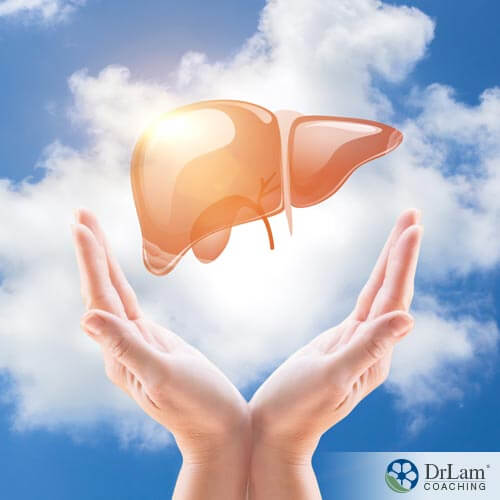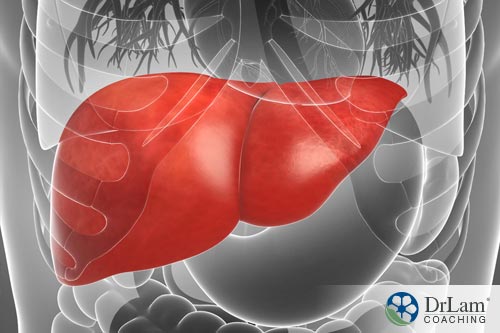 The liver is the most amazing multitasking organ in your body. It is the major center of detoxification and protein generation and is essential for your entire system to function smoothly. It is a fascinating fact that the liver is the only organ of your body that grows and shrinks according to your body’s demand. This ensures there is no energy waste—your liver size increases by 50 percent when you’re active throughout the day and shrinks at night when your body requires less energy and you’re not consuming any food. However, any disturbance in your circadian rhythm can hamper your liver’s natural cycle leading to serious implications on your liver function. In certain cases, if your liver is not functioning properly, it can be fatal. Furthermore, animal studies have linked fluctuations in liver size to normal resting and eating cycles.
The liver is the most amazing multitasking organ in your body. It is the major center of detoxification and protein generation and is essential for your entire system to function smoothly. It is a fascinating fact that the liver is the only organ of your body that grows and shrinks according to your body’s demand. This ensures there is no energy waste—your liver size increases by 50 percent when you’re active throughout the day and shrinks at night when your body requires less energy and you’re not consuming any food. However, any disturbance in your circadian rhythm can hamper your liver’s natural cycle leading to serious implications on your liver function. In certain cases, if your liver is not functioning properly, it can be fatal. Furthermore, animal studies have linked fluctuations in liver size to normal resting and eating cycles.
To understand how your liver size varies throughout the day, Swiss researchers documented the expansion and contraction of the livers of mice. It was found that the size of liver cells increases two-fold and can contract by up to 40 percent. This remarkable ability was observed only if the mice followed their natural eating and resting pattern.
During the research, the team also found that hepatocytes—the liver’s primary cells—expand during the night when mice are most active. This, in turn, helped boost ribosome activity. Ribosomes are structures in your cells that use RNA to make protein and your liver produces these proteins and other important molecules from consumed food to support various bodily functions. An increase in the number of ribosomes indicates your liver is in full function. Then, when this daily cycle ends, your liver automatically breaks down the additional ribosomes.
 Furthermore, researchers have found that your food intake is an important factor in ribosome production by your liver. In addition, time of the day was shown to make a difference. The cells within your liver are highly sensitive to your body’s circadian rhythm. During this particular study, mice livers were found to increase in size at night after consuming food—mice are nocturnal. However, mice that ate during the day did not exhibit the same increase in liver size. This quite clearly suggests that the liver responds to food as well as environment. Therefore, the group of mice maintained in their natural nocturnal state exhibited smoother liver expansion and contraction curves. At the two extremes, there was a 1.6-fold gap in the quantity of protein in the liver. However, mice fed during the day did not show any difference in liver size.
Furthermore, researchers have found that your food intake is an important factor in ribosome production by your liver. In addition, time of the day was shown to make a difference. The cells within your liver are highly sensitive to your body’s circadian rhythm. During this particular study, mice livers were found to increase in size at night after consuming food—mice are nocturnal. However, mice that ate during the day did not exhibit the same increase in liver size. This quite clearly suggests that the liver responds to food as well as environment. Therefore, the group of mice maintained in their natural nocturnal state exhibited smoother liver expansion and contraction curves. At the two extremes, there was a 1.6-fold gap in the quantity of protein in the liver. However, mice fed during the day did not show any difference in liver size.
The question now is whether these findings about mice can be applied to humans? Certain evidence suggests the human liver exhibits similar tendencies. The only study on human liver size was conducted in 1986 and involved measuring the liver size of volunteers via ultrasound across a six-hour timeframe. In this study, variation in liver size of about 20 percent was observed but liver lengths were not measured at night when your body’s rhythms are much slower.
Studies have linked exposure to bright light during attempted sleep with a disturbed sleep cycle. Further, night-time light has been shown to increase your risk of depression, diabetes, obesity, and certain types of cancer. Further, the human body is designed to function in sync with the natural light and darkness cycles. Your systems are at their peak during the day and gradually slow down as dusk approaches. Scientific research suggests that illumination may also affect the human digestive system. Moreover, extending your bedtime to long after sunset could be unhealthy.
Your liver protects your body from harmful toxins, generates proteins and chemicals essential for digestion and energy, recycles worn-out red blood cells, regulates hemoglobin, secretes bile to eliminate bad cholesterol, and regulates glycogen levels. This amazing organ is even capable of regenerating itself. When the liver does not function according to design, your entire system can be disturbed; therefore, smooth liver function is vital for maintaining a healthy body.
As studies have directly linked the natural expansion and contraction of the liver with circadian rhythm, this suggests that normal fluctuation in liver size is a sign of good liver health.
Healthy liver functioning ensures
On the other hand, if your liver size is not changing with your body’s energy requirements and circadian rhythm, this may indicate dysregulation of your liver function. In addition, consuming a large amount of alcohol as well as other factors are associated with poor liver health including chronic malnutrition, side effects of certain medications, prolonged infections, chronic hepatitis B, exposure to toxic materials, consumption of poisonous wild mushrooms and uncooked shellfish, and stress.
Constant exposure to stress can have a negative impact on your liver. The NeuroEndoMetabolic (NEM) stress response system is a delicate network of six circuits—including the detoxification circuit comprised of the liver, kidneys, and lymphatic system—and various organs functioning in a close coordination to protect your body from stress. The adrenal glands are a pair of walnut-shaped glands located above your kidneys and are an important part of this system.
 During stressful situations, your NEM response signals to your adrenals to start secreting the anti-stress hormone cortisol. However, constant stress can overburden your adrenals leading to a decrease in cortisol production. This reduces your body’s natural stress-fighting ability, which could result in adrenal fatigue.
During stressful situations, your NEM response signals to your adrenals to start secreting the anti-stress hormone cortisol. However, constant stress can overburden your adrenals leading to a decrease in cortisol production. This reduces your body’s natural stress-fighting ability, which could result in adrenal fatigue.
Fatigue can be a prevalent symptom of poor liver health. However, when you frequently experience extreme fatigue along with low energy levels, brain fog, insomnia, difficulty waking up, low concentration levels, constipation, stubborn weight gain, and cravings for salty and fatty foods, chances are high that you may be suffering from Adrenal Fatigue Syndrome (AFS).
The adrenal glands and liver are closely connected through the anti-stress hormone cortisol. If you suffer from AFS, your adrenals glands are overburdened and thus unable to secrete adequate amounts of cortisol. This imbalance in cortisol levels can lead to liver fatigue thereby causing dysregulation of your detoxification circuit. This imbalance can lower your immunity and result in additional symptoms like brain fog, electromagnetic field sensitivity, supplement intolerances, as well as other chemical and environmental sensitivities. Since your NEM stress response system is such an intricate network, an imbalance in just one of these circuits or organs can affect your entire stress response.
A weak liver can also contribute to insufficient function of your adrenal glands. An overburdened liver will exert stress on your body and increase your chances of developing adrenal fatigue. On the other hand, overburdened adrenal glands cause an imbalance in your cortisol levels thereby increasing your risk of liver congestion.
A healthy liver is the foundation for a healthy body. Liver congestion can become a major roadblock in treating various disorders including adrenal fatigue. Indiscriminate use of drugs, herbs, glandular compounds, and detoxification can worsen the symptoms of AFS and concurrently affect liver function. Therefore, a more fundamental approach that carefully considers liver function is essential to correctly addressing your internal health conditions and optimizing your recovery process.
 The liver is a fascinating organ and the foundation for good health. It is a central component of your body involved in both energy generation and detoxification. Studies on mice have shown that liver size increases during the night and decreases during the day since mice are nocturnal creatures and are therefore more active during the night. Scientists observed that fluctuations in liver size were exhibited more prominently when mice were allowed to follow their natural resting and eating cycles. The same can be related to humans. Research has shown that the human liver expands and contracts in accordance with circadian rhythm. Any disturbance to this rhythm can reduce liver size fluctuations. This can lead to liver dysfunction and cause an imbalance in your detoxification circuit and stress response system. A healthy liver is pertinent to a successful recovery from any health disorder including adrenal fatigue.
The liver is a fascinating organ and the foundation for good health. It is a central component of your body involved in both energy generation and detoxification. Studies on mice have shown that liver size increases during the night and decreases during the day since mice are nocturnal creatures and are therefore more active during the night. Scientists observed that fluctuations in liver size were exhibited more prominently when mice were allowed to follow their natural resting and eating cycles. The same can be related to humans. Research has shown that the human liver expands and contracts in accordance with circadian rhythm. Any disturbance to this rhythm can reduce liver size fluctuations. This can lead to liver dysfunction and cause an imbalance in your detoxification circuit and stress response system. A healthy liver is pertinent to a successful recovery from any health disorder including adrenal fatigue.
Your liver size increases during the day and contracts at night which is a sign of good health. Disturbances of your circadian rhythm can disrupt these natural fluctuations leading to poor liver health. This can directly affect your detoxification circuit and stress response system. Poor liver health can lead to adrenal fatigue, weak immunity, low energy levels, bad breath, brain fog, a sluggish metabolism, chronic fatigue, and a poor appetite.
